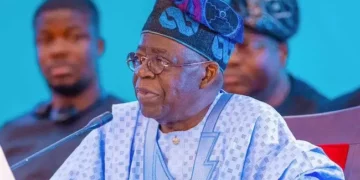The Benue State governor-elect, Rev. Fr. Hyacinth Iormem Alia, has said that he has worked for over 32 years as a Catholic Priest without a wife, therefore he did not need a First Lady to govern the state.
Fr. Alia who spoke through his director of communications, Tersoo Kula, said aside being a Priest without a wife, the Constitution of Nigeria does not even recognise the Office of the First Lady, and therefore the First Lady does not have any major role in the governance of the state.
Fr Alia, in his reaction after his declaration as governor-elect said: “My fellow citizens, a new Benue is possible, and I enjoin all of you to join hands with me to make it a reality. Let us begin by embracing a new way of thinking and action by cultivating a new ethos that expresses the best of us, that brings forth our better angels and not our worst demons.”
According to him, unending political recriminations and willful economic sabotage must give way to accommodation and the pursuit of loftier ideals.
Meanwhile, Fr Alia has promised to clear the backlog of salary arrears, pensions and gratuities, resettle IDPs in their ancestral homes, address persistent security challenges and set the stage for a prosperous Benue.
“I would like to congratulate my opponents from the other parties for making it an interesting contest. However, the anxious period of politicking is over. Now is the time to unite and face the challenges of development,” he added.
The clergyman said that he needs to set the foundations for a strong economy and to start building an economy of the future based on skills and talents and education and the application of technology with the realization that the forces of global competition and technology mean that “we can only compete based on skills and talents. Let us unlock our wealth.”
Meanwhile, some Civil Society Organisations (CSOs) have attributed the loss of some big betters in the 2023 general elections to bad governance and the improvement in the electoral system.
The 2023 general elections have seen upsets with prominent politicians in parts of the country losing election to mostly unknown names.
The CSOs that spoke to LEADERSHIP are: Transition Monitoring Group (TMG), Transparency International (TI) and the Civil Society Legislative Advocacy Centre (CISLAC).
Speaking through their leader, Awwal Musa Rafsanjani, the CSOs said bad governance and disenchantment by Nigerians mainly caused big names to lose election.
“I think the reason why they lost the election is because the electorate are tired of their bad governance. What we are seeing today is a lack of satisfaction in their performance.
In the case of Zamfara, you could see that every day bandits are killing the people. And people reacted for lack of good governance.
“In Benue, the governor owes salaries of civil servants, especially teachers. That’s why the Benue people got tired because workers are dying and he was using public money for propaganda. The same thing with the Abia Governor. He failed to provide quality governance. So, it is a response to bad governance; they voted them out.
The sanitisation of the electoral process from the electoral act is a major breakthrough.
“Those who had their way had to work extra hard. So, what governors did to impose themselves in the past have been blocked. Only a few of them could succeed in electoral malpractices and we will keep improving on the electoral process,” Rafsanjani said.

Matawalle
Judging from the state political index since 1999, the Peoples Democratic Party (PDP) had over the years faced an uphill task in its bid to form the government in Zamfara State due to the continuous cracks on the walls of the party.
However, with a total of 377,726 votes, Dauda Lawal Dare of the PDP defeated the incumbent governor of Zamfara Bello Matawalle, who polled 311,976 votes in arguably the biggest upset of the 2023 general elections.
In the buildup to the polls, Lawal, a banker, faced a lot of hurdles, especially litigations on his nomination as governorship candidate. The Supreme Court annulled the primaries that produced him and a new one was conducted. But that was not the first time he would be at the Supreme Court for a case. In 2021, the apex court ordered the Economic and Financial Crimes Commission (EFCC) to release the N9 billion it seized from Lawal.
One of the major factors adduced to Matawalle’s loss is his defection to the ruling All Progressives Congress (APC). Matawalle had lost election as a PDP contestant in 2019 but became a major beneficiary of the Supreme Court judgement which nullified the Zamfara APC governorship primaries a week before the May 29, 2019 inauguration of a new government.
On May 29, 1999 former governor, Ahmad Sani Yarima, and his deputy at that time, Shinkafi, were sworn in as the first executive civilian governor and deputy governor of Zamfara State. They were re-elected under the platform of the then All Nigeria Peoples Party (ANPP) in 2003.
At the expiration of their tenure in 2007, Yarima anointed Shinkafi as his successor and supported him strongly. As such, Shinkafi was able to defeat the PDP candidate, a former governor of the old Sokoto State, Mallam Yahaya Abdulkarim. Yarima was the only governor who handed over power to his deputy in the country, a development that attracted praises from different political quarters.
Of the 11 governors who sought to be re-elected, Matawalle is the only one who did not scale through. The other person whose fate is yet to be sealed is Governor Ahmadu Fintiri of Adamawa whose election did not end on the first ballot. Unlike Matawalle, all hope is not yet lost for Fintiri.
However, there are indications that Lawal will defect to the ruling APC, like the man he is succeeding.
Omo-Agege
On Monday, the APC governorship candidate in Delta State, Ovie Omo-Agege, lost the governorship seat to PDP’s Sheriff Oborevwori.
Omo-Agege during the election polled 240,229 votes while Oborevwori secured 360,234 votes, a difference of 120,005.
Despite being the deputy president of the Senate and the senator representing Delta State Central Senatorial District, Omo-Agege won in only four of 25 local government areas in the state.
Prior to the governorship elections, pundits thought Rt Hon Sheriff Oborevwori will beat Omo-Agege due to his leadership qualities and antecedents over the years.
Abubakar
Bala Mohammed of the PDP has been re-elected the governor of Bauchi State for another four-year term.
Mohammed polled 525,280 votes to trounce his closest rival and the candidate of the APC, Air Marshal Sadique Abubakar who polled 432,272. Abubakar is Nigeria’s immediate past Chief of Air Staff.
However, Abubakar has rejected the governorship election results held in the state on Saturday, claiming the election was marred with rigging.
Abubakar said, “Our preliminary interrogation of INEC e–platforms produced evidence of unprecedented manipulation of the results in total disregard of extant electoral laws and rules.
“It is clear to us that based on what we now know, I am the clear winner of this election.
“How else can someone explain the results from Toro, Warji, Zaki, Alkaleri and Bauchi Local Government Areas, where violence led to the cancellation of results among others?”
He added the party would consult stakeholders to determine the next line of action even as he told his supporters to remain calm and peaceful.
Ortom
The governor of Benue, Samuel Ortom, lost his senatorial bid to Titus Zam of the All Progressives Congress.
In a race to clinch the state’s north-west senatorial seat, Zam polled 143,151 votes to defeat Ortom who got 106,882 votes.
Ortom had earlier said he was ready to sacrifice his bid to ensure Peter Obi of the Labour Party (LP) won the presidential election.
The Benue governor is also part of G-5 governors who are at loggerheads with the national leadership of the party.
Ortom had election on the platform of the APC where he defected to, after losing the PDP governorship ticket in 2014, and defected to PDP in 2019 to pursue his governorship ambition.
While reacting to critics’ allegation that he had not performed as governor, he claimed that PDP was a more credible alternative for him to achieve his policies.
“We had to abandon that platform in search of one that offers more accommodation and support for our policies, especially the Open Grazing Prohibition and Ranches Establishment Law 2017,” he said.
He lamented that highly placed officials in the APC-led federal government made various attempts to frustrate an imperative legislation aimed at finding lasting peace between farmers and herders in the state.
“Such frustrating efforts by highly placed members of the federal government necessitated my exit from the party to one that will not compromise our stance on a matter so key to the Benue people,” he said.
LEADERSHIP reports that the issue of nonpayment of salaries, gratuities, pensions and lack of road infrastructure projects were major factors that cost his senatorial bid.
Ugwuanyi
Enugu State Governor Ifeanyi Ugwuanyi also lost his bid to represent the people of Enugu North at the Senate.
Ugwuanyi of the PDP contested the seat against 10 others from different political parties.
Results of the senatorial election showed that Okey Ezea of the Labour Party (LP) defeated Ugwuanyi.
The Returning Officer, Prof. Chukwuemeka Ubaka, who announced the result of the election, said Ezea polled 104, 492 votes to beat Ugwuanyi, who garnered 46, 948 votes. The APC candidate, Eze Simon, came third with 6,816 votes.
The result sheet also showed that the governor was well beaten in his Udenu Council.
Ugwuanyi is one of the G-5 governors;
Ikpeazu
Another big loser is Governor Okezie Ikpeazu of Abia State, one of the G-5 governors that fell out with the party’s leadership ahead of the polls.
The candidate of the All Progressives Grand Alliance (APGA), Enyinnaya Abaribe, was declared the winner of Saturday’s senatorial election in Abia South District.
During the election, Abaribe scored 49,903 votes, Labour Party (LP) candidate Chinedu Onyeizu scored 43,903, while Ikpeazu of the PDP scored 28,422 votes to come third.
The Returning Officer for Abia South National Assembly elections, Georgina Ugwuanyi, announced this before party agents at the collation centre in Aba.
However, Ikpeazu has faulted INEC for declaring Abaribe the winner of the Abia South Senatorial election.
Ikpeazu marveled at why Abaribe was declared winner in the election after the electoral body affirmed polls were not conducted in 108 polling units in Obingwa, Aba South and Abia North.
Ikpeazu disclosed the affected units have 200,000 cumulative voters, more than the votes of all parties.
He alleged that more than 50,000 supporters of the PDP could not exercise their franchise due to the non-provision and late arrival of electoral materials in the district’s Local Government Areas.
Chimaroke Nnamani
Senator Chimaroke Nnamani of the PDP has continued to groan over his loss in the Enugu East Senatorial District election the Labour Party rival, Mr Chukwu who replaced his slain brother, Barr Oyibo Chukwu on the LP ticket.
Senator Nnamani, a former governor, seemingly blamed Ugwuanyi as being responsible for his defeat.
Chimaroke questioned the meaning of someone saying, ”We all will lose,” a statement reportedly credited to Ugwuanyi after losing his senatorial election, believing he (Ugwuanyi) worked against him.
He also wondered who organised and financed his expulsion from the party and the thought process of choosing agents for him, whom he believed worked against him.





